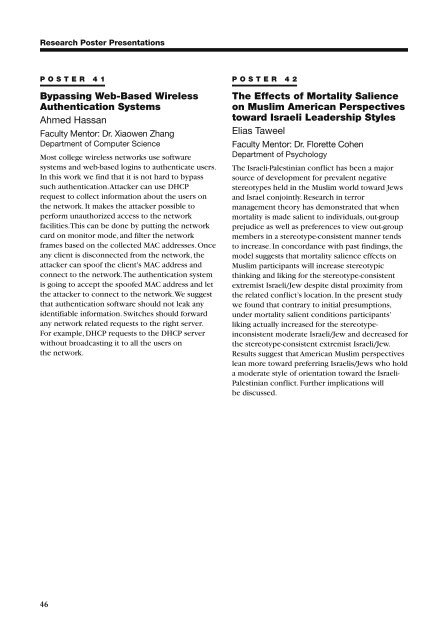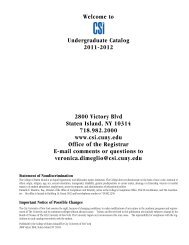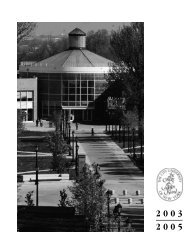Csi undergraduate conference on research, scholarship...
Csi undergraduate conference on research, scholarship...
Csi undergraduate conference on research, scholarship...
You also want an ePaper? Increase the reach of your titles
YUMPU automatically turns print PDFs into web optimized ePapers that Google loves.
Research Poster Presentati<strong>on</strong>s<br />
P O S T E R 4 1<br />
Bypassing Web-Based Wireless<br />
Authenticati<strong>on</strong> Systems<br />
Ahmed Hassan<br />
Faculty Mentor: Dr. Xiaowen Zhang<br />
Department of Computer Science<br />
Most college wireless networks use software<br />
systems and web-based logins to authenticate users.<br />
In this work we find that it is not hard to bypass<br />
such authenticati<strong>on</strong>. Attacker can use DHCP<br />
request to collect informati<strong>on</strong> about the users <strong>on</strong><br />
the network. It makes the attacker possible to<br />
perform unauthorized access to the network<br />
facilities. This can be d<strong>on</strong>e by putting the network<br />
card <strong>on</strong> m<strong>on</strong>itor mode, and filter the network<br />
frames based <strong>on</strong> the collected MAC addresses. Once<br />
any client is disc<strong>on</strong>nected from the network, the<br />
attacker can spoof the client's MAC address and<br />
c<strong>on</strong>nect to the network. The authenticati<strong>on</strong> system<br />
is going to accept the spoofed MAC address and let<br />
the attacker to c<strong>on</strong>nect to the network. We suggest<br />
that authenticati<strong>on</strong> software should not leak any<br />
identifiable informati<strong>on</strong>. Switches should forward<br />
any network related requests to the right server.<br />
For example, DHCP requests to the DHCP server<br />
without broadcasting it to all the users <strong>on</strong><br />
the network.<br />
46<br />
P O S T E R 4 2<br />
The Effects of Mortality Salience<br />
<strong>on</strong> Muslim American Perspectives<br />
toward Israeli Leadership Styles<br />
Elias Taweel<br />
Faculty Mentor: Dr. Florette Cohen<br />
Department of Psychology<br />
The Israeli-Palestinian c<strong>on</strong>flict has been a major<br />
source of development for prevalent negative<br />
stereotypes held in the Muslim world toward Jews<br />
and Israel c<strong>on</strong>jointly. Research in terror<br />
management theory has dem<strong>on</strong>strated that when<br />
mortality is made salient to individuals, out-group<br />
prejudice as well as preferences to view out-group<br />
members in a stereotype-c<strong>on</strong>sistent manner tends<br />
to increase. In c<strong>on</strong>cordance with past findings, the<br />
model suggests that mortality salience effects <strong>on</strong><br />
Muslim participants will increase stereotypic<br />
thinking and liking for the stereotype-c<strong>on</strong>sistent<br />
extremist Israeli/Jew despite distal proximity from<br />
the related c<strong>on</strong>flict’s locati<strong>on</strong>. In the present study<br />
we found that c<strong>on</strong>trary to initial presumpti<strong>on</strong>s,<br />
under mortality salient c<strong>on</strong>diti<strong>on</strong>s participants’<br />
liking actually increased for the stereotypeinc<strong>on</strong>sistent<br />
moderate Israeli/Jew and decreased for<br />
the stereotype-c<strong>on</strong>sistent extremist Israeli/Jew.<br />
Results suggest that American Muslim perspectives<br />
lean more toward preferring Israelis/Jews who hold<br />
a moderate style of orientati<strong>on</strong> toward the Israeli-<br />
Palestinian c<strong>on</strong>flict. Further implicati<strong>on</strong>s will<br />
be discussed.





